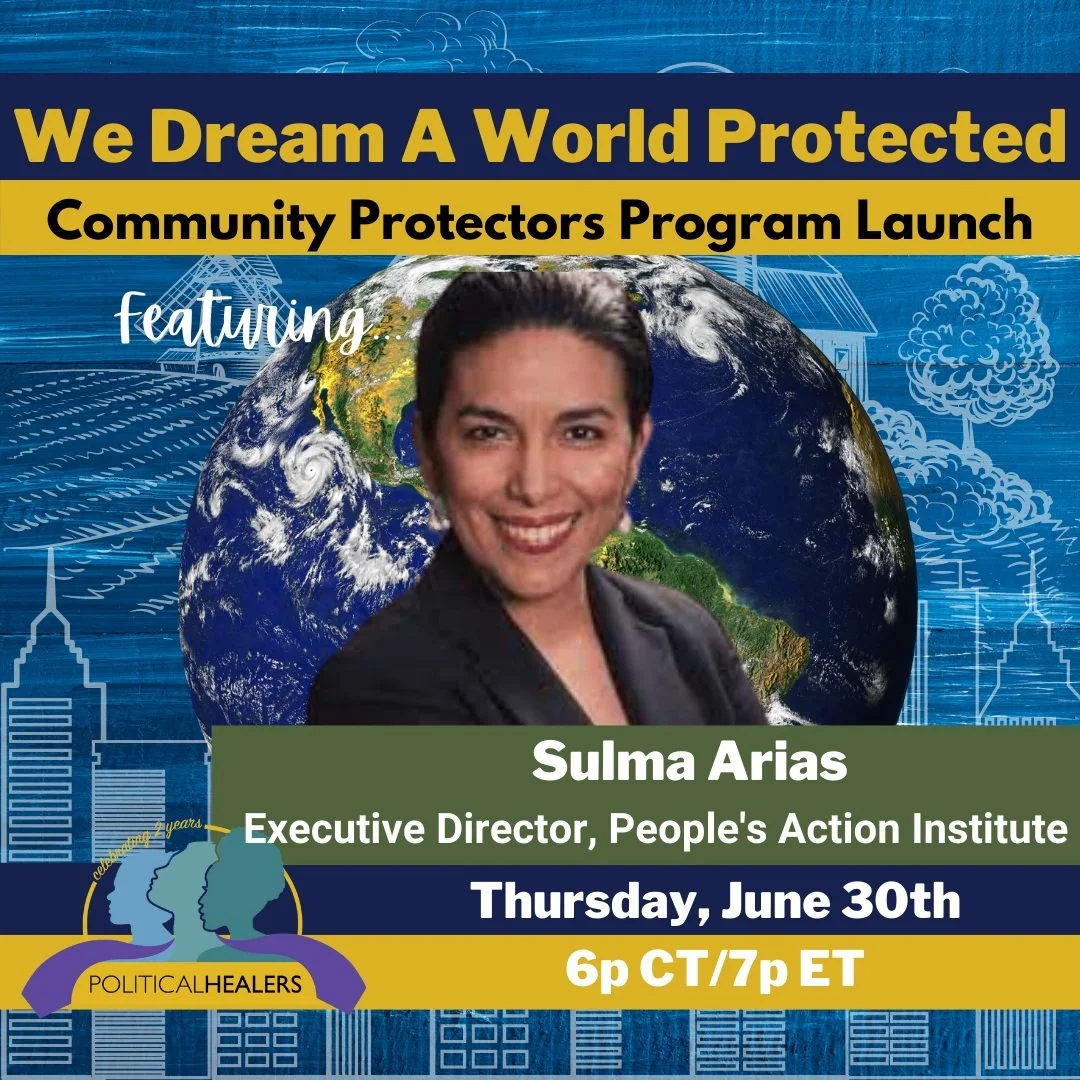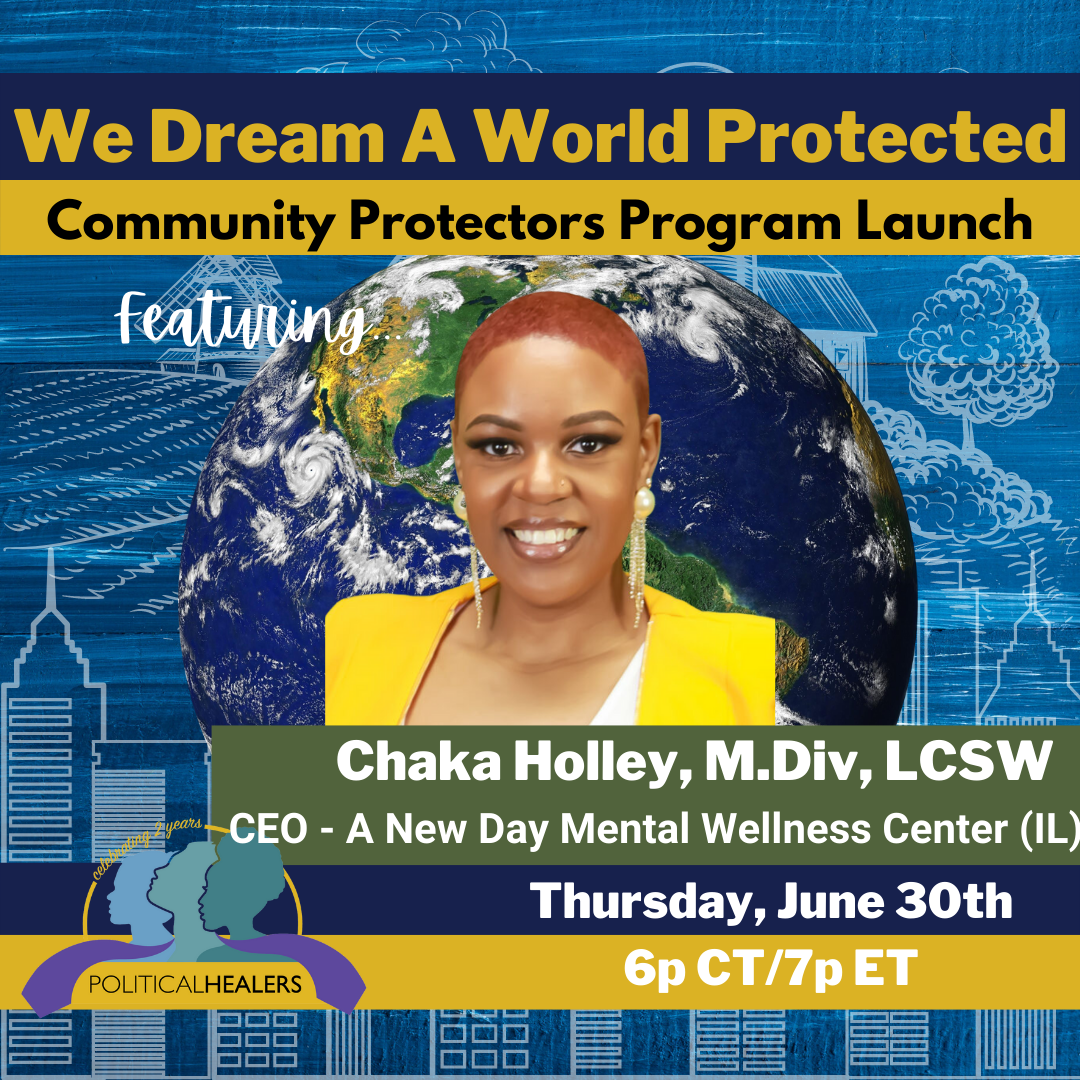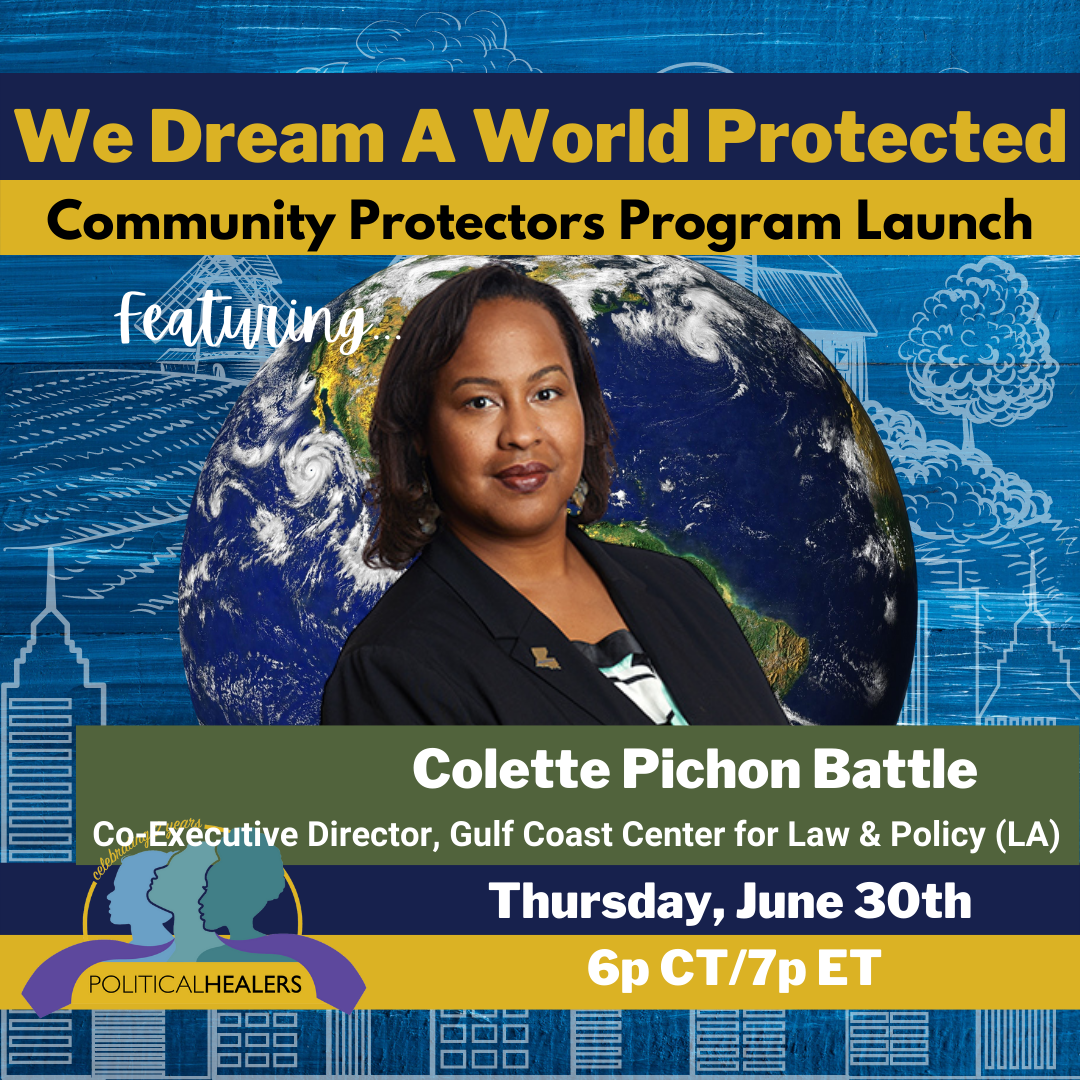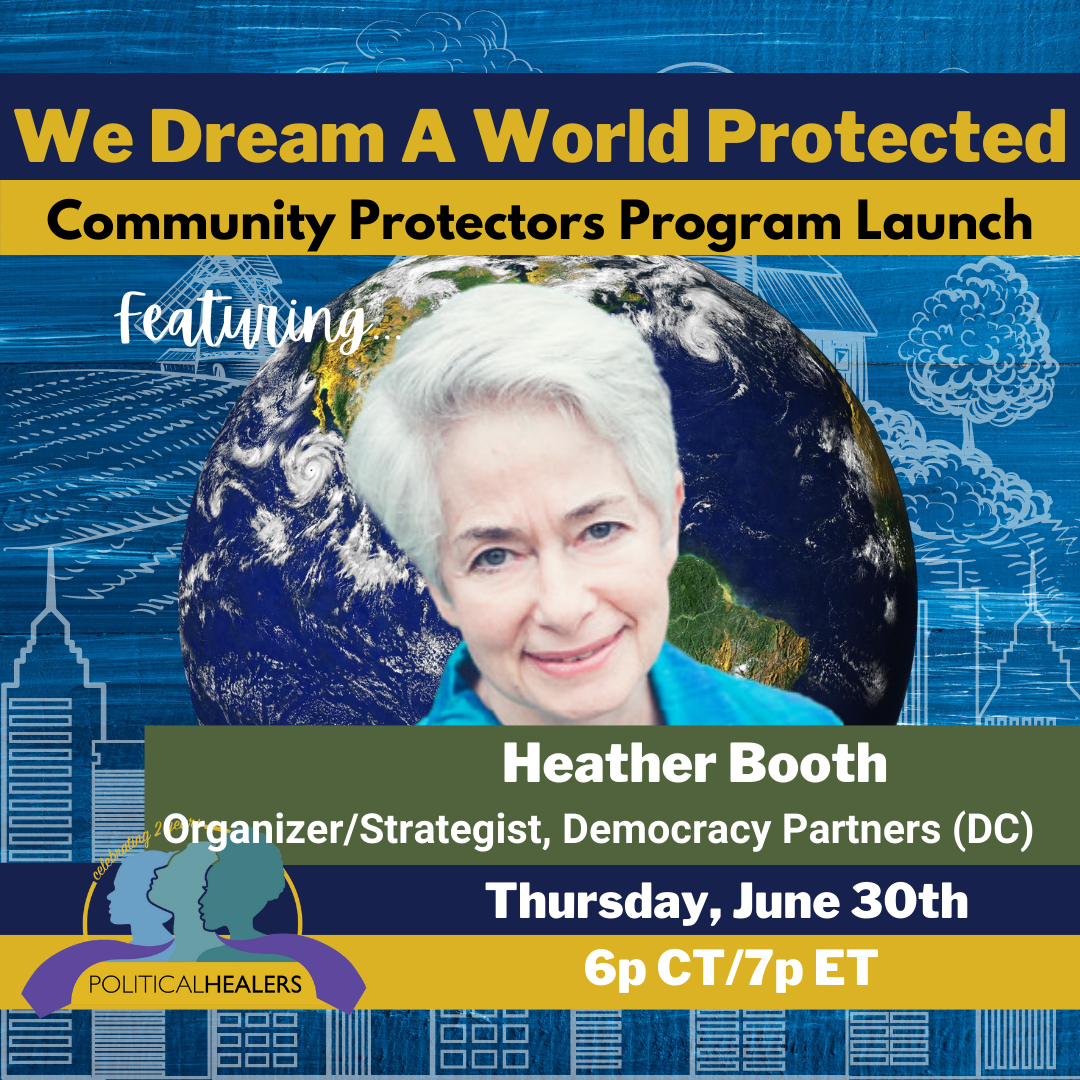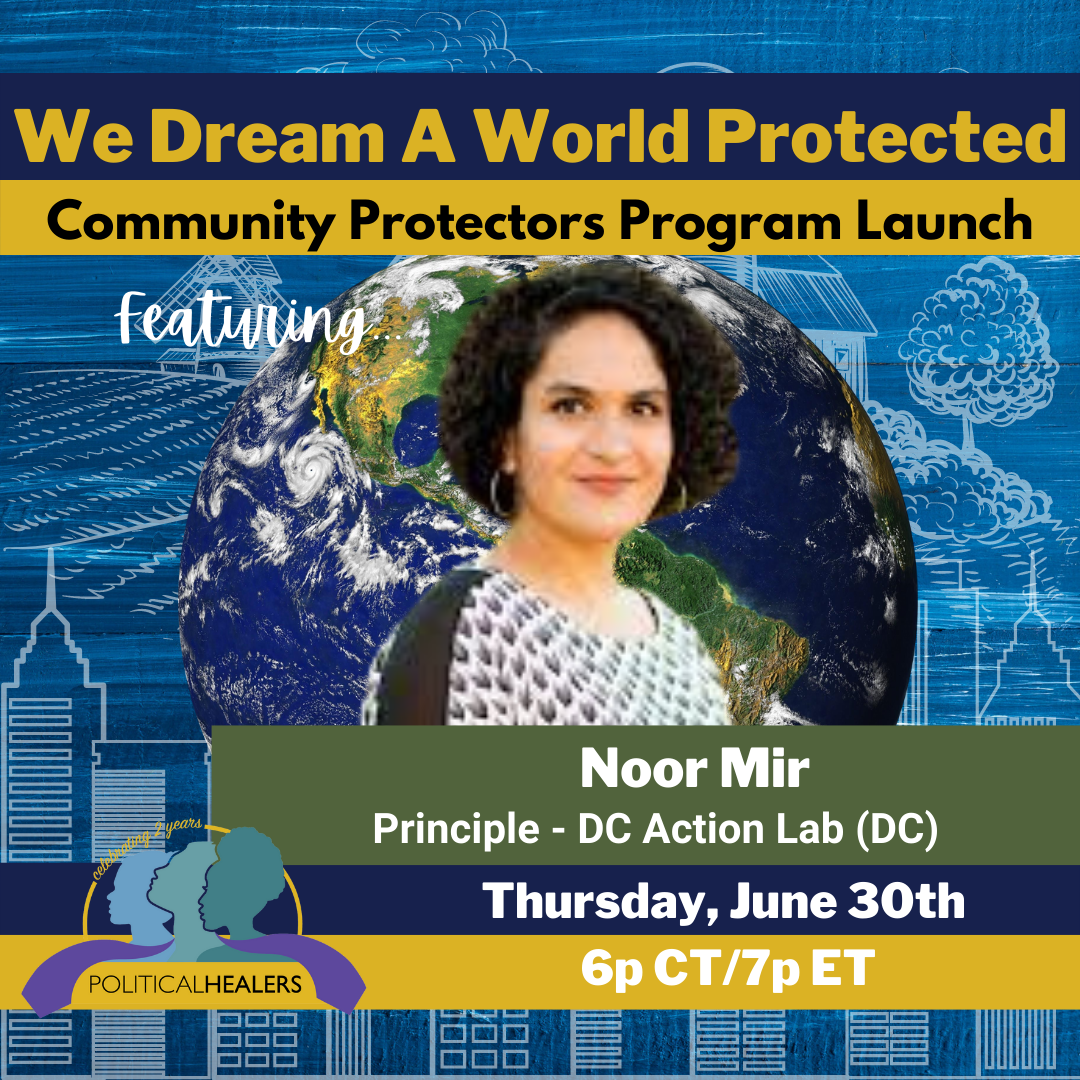To launch our new Community Protection Program, the Political Healers Project invites you to join us as we hear from a panel of protection experts, frontline organizers and leaders from across the country who protect their communities in areas like crisis mitigation, mental health, participatory defense, and reproductive justice support. We’ll get to hear how they organically utilized a community protector role and mapped it onto a power building phenomenon.
We will also unveil our Community Protectors Toolkit, which includes stories from these same frontline protection experts, as well as tools and resources to support people's ability to address the various crises within their own communities.
We are collaborating with protection experts who are working on a variety of issues around the country in order to:
Provide a community protection toolkit that aims to give its readers a deeper imagination about what protection work could look like;
Provide nuts and bolts training on how to do community protection work in specific areas
Provide a collective conversation about what community protection is, what it can look like, and what people can do to prepare themselves for this work.
Our esteemed panelists include:
Sulma Arias is the executive director of People’s Action Institute and People’s Action, a national network of state and local grassroots power-building organizations united in fighting for justice. In this role, Sulma is coming home to the network, having previously served as the lead for immigration and worker justice for National People’s Action.
Prior to returning to People’s Action, Sulma was the director of immigration and power building for Community Change and Community Change Action.
Before joining Community Change, Sulma was the executive director for Sunflower Community Action in Kansas, a multi-racial grassroots organization that worked on issues of racial and economic inequality and immigrant justice. Under her leadership, a coalition of local and national organizations attempted to defeat Kris Kobach as he ran for Secretary of State in Kansas. In 2018, The New York Times editorial board noted that Kobach represents “the ugliest part of today’s Republican Party.”
Sulma got her start in organizing with Sunflower Community Action in 1999, where she helped launch a statewide campaign that would permit undocumented immigrants to obtain state driver’s licenses. She also mobilized grassroots participation to introduce and successfully pass Kansas's in-state tuition bill. In 2004, as the Organizing Director for Sunflower, Sulma helped expand Sunflower Community Action to a statewide organization.
In 2005 Sulma left her role at Sunflower to lead the immigration and worker justice program for National People’s Action (now People’s Action), where she coordinated training and capacity building for 12 grassroots organizations in 10 states for six years.
When Sulma returned to take the helm at Sunflower in 2011, she set up the state's first grassroots political home under the name of Kansas People’s Action. In addition to exposing Kris Kobach’s role as the anti-immigrant legislation architect, this fight helped to set the groundwork for his eventual defeat in 2018 and helped put Kansas as a critical state on the map.
Sulma’s leadership and compassion for immigrant communities is rooted in the story of her own migration from El Salvador at 12 years old with her niece and nephew (ages 3 and 5).
Chaka Holley is a Licensed Clinical Social Worker from Grand Rapids, Michigan. Where she received a Master of Social Work Degree from Western Michigan University with a concentration in Marriage and Family Therapy. She began her career as a therapist working with college students predominantly addressing academic and family concerns.
Throughout the years, she has provided both psychotherapy and Spiritual care and counseling to people from an array of backgrounds. Her clients have included people experiencing the challenges of homelessness, incarceration, juvenile justice, foster care, chronic illness and poverty, as well as clergy, activists, people navigating the professional work world. She specializes as a Mental Health Integrative Medicine Practitioner, Brainspotting Therapist, EMDR Therapist, Certified Clinical Trauma Professional, Certified Integrative Mental Health Professional, and certified Prepare/Enrich Premarital counselor. Chaka is also the president of Coloring Mental Health Collective, which advocates and organizes for the mental wellness of Black and Brown people. It also seeks to dismantle oppressive ideologies and behaviors that cause emotional suffering.
In addition to counseling, Chaka has been known for her advocacy work in various cities across the country with organizations like Black Lives Matter, Our Kitchen Table, Michigan Organizing Project and the Samuel DeWitt Proctor Conference. She is trained in various forms of community organizing and has worked on campaigns to end Mass Incarceration, Education Reform, Food Justice and more.
Chaka also received a Master of Divinity Degree from Chicago Theological Seminary. Chaka is an ordained minister and has been known for providing memorial services and officiating weddings for people experiencing homelessness. She has held many religious leadership roles including senior pastor and Chaplain.
Colette Pichon Battle is a generational native of Bayou Liberty, Louisiana. As founder and Co-Executive Director of the Gulf Coast Center for Law & Policy (GCCLP), she develops programming focused on equitable disaster recovery, global migration, community economic development, climate justice, and energy democracy.
Colette worked with local communities, national funders, and elected officials in the post-Katrina and post-Deepwater Horizon disaster recovery. She was a lead coordinator for Gulf South Rising 2015, a regional initiative around climate justice and just transition in the South. In 2015 Colette was selected as an Echoing Green Climate Fellow, in 2016 she was named a White House Champion of Change for Climate Equity, and in 2018 Kenyon College awarded her an Honorary Doctorate. In 2019, Colette was named an Obama Fellow for her work with Black and Native communities on the frontline of climate change and she gave a TED Talk, “Climate change will displace millions. Here’s how we prepare.” In 2021, Colette was appointed a Margaret Burroughs Community Fellow. In addition to developing advocacy initiatives that intersect with race, systems of power, and ecology, Colette directs GCCLP’s legal services in immigration and disaster law.
Under Colette's leadership, the Gulf Coast Center for Law & Policy co-chairs the national Water Equity and Climate Resilient Caucus with PolicyLink, serves on the steering committee of the Ocean Justice Forum, and anchors the five-state, multi-issue initiative Gulf South for a Green New Deal. Colette also co-founded and led the Red, Black & Green New Deal, the national climate initiative for the Movement for Black Lives.
Colette serves on the boards of the US Climate Action Network and the Highlander Research and Education Center, advises the Kataly Foundation’s Environmental Justice Resourcing Collective, and chairs the Equity Advisory Group of the Louisiana Governor’s Climate Initiative Task Force.
Heather Booth started organizing in the Civil Rights and Women’s Movements. She has since become one of the country’s leading strategists about progressive issue campaigns and driving issues in elections. Booth was the founder of JANE, an underground abortion service predating Roe v. Wade. She was also the founding Director and now President of the Midwest Academy, training social change leaders and organizers. Just a few of her leadership roles during the last 50+ years include the Director of the NAACP National Voter Fund (2000), the lead consultant of the Campaign for Comprehensive Immigration Reform (2005), director of the Health Care Campaign for the AFL-CIO (2008), founding director of Americans for Financial Reform (2010), national coordinator for the coalition around marriage equality (2013), the field director for the campaign to stop the tax giveaways to millionaires and billionaires (2017) and director of the Progressive and Seniors Outreach for the Biden/Harris campaign. Most recently, she has been working to pass the Build Back Better proposal to lower costs, create jobs, and ensure the wealthiest pay a fair share in taxes. There is a movie about her life: Heather Booth: Changing the world and a new HBO movie that includes her work called The Janes.
Noor Mir (she/her) is a DC-based organizer, campaign strategist, trainer, and a partner at DC Action Lab, a worker-owned collective. Born and raised in Islamabad, Pakistan where her grandmother still lives, Noor moved to the United States in 2008 and lives in DC, on occupied Piscataway land. Her foundation in movement spaces is as an anti-war activist. The courage of anti-war activists on the ground shaped her worldview and drives her work as an immigrant from a country that’s been impacted by U.S. policy. Noor led the Ground the Drones campaign at the anti-war organization CODEPINK: Women for Peace, where she organized with the families of survivors and victims of drone strikes from Yemen and Pakistan. She then worked as a field organizer and then as a national campaigner for police accountability and criminal justice at Amnesty International, focusing on state and federal advocacy on lethal force and data collection and reporting and coordinated the first international human rights observer deployments to Ferguson and Baltimore in her time at the organization. For the past five years at DC Action Lab, Noor has led on campaign strategy and rapid response design with a plethora of people-powered movements such as the No Muslim Ban Ever Campaign, Women’s March, Firedrill Fridays and multiple campaigns for immigration justice. Noor currently serves on the Board of the War Resisters League and is the co-chair of Collective Action for Safe Spaces. Noor also serves on DC’s Mayoral Advisory Committee Against Street Harassment. Noor lives in DC with her husband and two cats.
Qiana Johnson is the founder of Life After Release, Inc., a formerly incarcerated women-led organization supporting system-involved people in the DMV (DC-Maryland-Virginia). She is organizing to build a post-conviction movement challenging the integrity of convictions and the system responsible for convicting us in the first place. She is a former local community organizer with Black Lives Matter DC, a national trainer with Silicon Valley Debug, Participatory Defense, and a proud member of the National Council for Incarcerated and Formerly Incarcerated Women and Girls.
Before her incarceration in 2015, she completed 10 years of Federal Government service. She is a recent graduate of the University of Maryland University College with a Bachelor of Science degree in Legal Studies and a concentration in Public Safety.
After her release from prison on August 21, 2017. Qiana immediately started doing work around prison abolition, prosecutor accountability, and ensuring that formerly incarcerated individuals get what they need to succeed.
Today Qiana’s purpose and passion lie in holding local government officials accountable and demanding progressive changes towards ending mass incarceration. She believes in ensuring public safety without the criminalization of a particular race or social class. She uses her story to empower formerly incarcerated women into becoming productive members of their communities.
Ruth Anna Buffalo is an American politician serving as a member of the North Dakota House of Representatives from the 27th District, serving from December 1, 2018. She is the first Native American Democratic woman elected to the North Dakota Legislature.
Buffalo was born in Watford City, North Dakota and raised in Mandaree, North Dakota. She is an enrolled citizen of the Mandan, Hidatsa, and Arikara Nation.She earned a Bachelor of Science degree in criminal justice from Si Tanka University and three master's degrees: 2 from the University of Mary, in management and in business administration, and one in public health from North Dakota State University.
Her involvement in politics began when she ran for North Dakota Insurance Commissioner in the 2016 North Dakota elections, but lost to Jon Godfread. In April 2017, she became party secretary of the North Dakota Democratic–Nonpartisan League and in July 2017, her mayor appointed her to the Fargo Native American Commission.
She replaced Randy Boehning, who was the primary sponsor of the Voter ID law that voting rights advocates warned would disenfranchise Native American voters.Other important issues in this 2018 race included access to health care, education (both K-12 and higher education), property taxes, and community safety.

